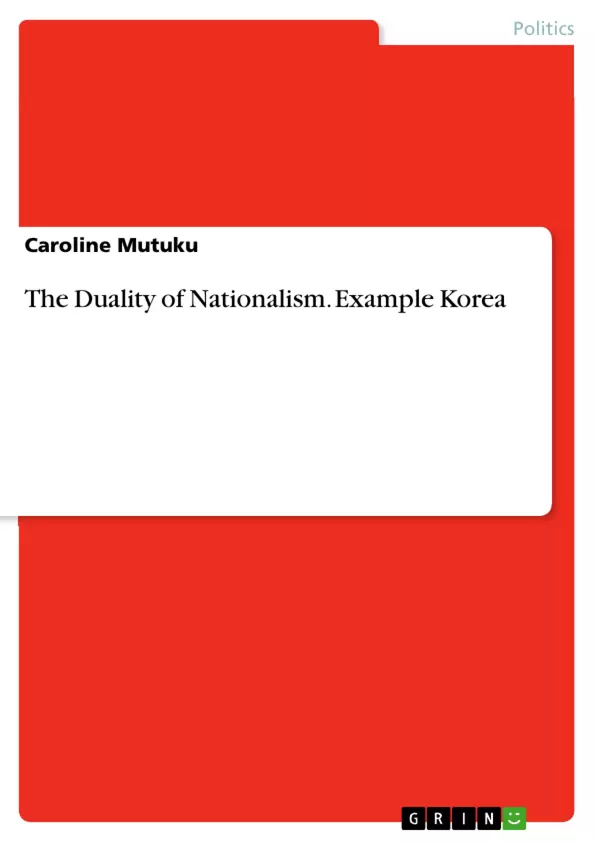Nationalism has been compared to a double-edged sword because it can either be a blessing, and consequently unite the people, or it can be a curse because of its divisive capability. Nationalism preys on the emotive aspiration of a community or an ethnic group.
In Korea, nationalism has had much to do with the nations turbulent past as well as the years of modern transformation when it was used as force anti-colonialism and modernization. Today, it is still a source of pride and inspiration for many Koreans and still functions as a important ideological anchor for national unification of the divided Korea.
On the other hand, nationalism has exacted a heavy toll to the Korean society in terms o their culture and political development. Many scholars hold the opinion that it has marginalized many competing voices in the name of the immortal nation as well as being a weapon of suppressing the civic rights and the freedom of the citizens. Korea is still battling with the task of transforming the national identity which is based on common ancestry into a cohesive democratic identity.
Inhaltsverzeichnis (Table of Contents)
- Nationalism Is a Double-Edged Sword
- Ethnic Nationalism: A Controversial Concept
- The Darker Side of Nationalism
- The Rise of Nationalism in Korea
- Nationalism: A Blessing or a Curse?
- The Role of Nationalism in Korean History
- Korea's Unique Experience of Nationalism
- The Intersection of Nationalism and Globalization
- The Future of Nationalism in Korea
- The Elusive Definition of “Minjok”
Zielsetzung und Themenschwerpunkte (Objectives and Key Themes)
The text explores the complexities of nationalism in Korea, examining its historical context, its multifaceted nature, and its impact on the country's political development. It aims to provide a nuanced understanding of the phenomenon by analyzing both its positive and negative aspects.
- The dual nature of nationalism
- The influence of historical context on Korean nationalism
- The distinction between ethnic and civic nationalism
- The impact of globalization on nationalism in Korea
- The complex definition and implications of "minjok"
Zusammenfassung der Kapitel (Chapter Summaries)
- The first chapter provides an overview of nationalism, highlighting its potential for both unity and division. It examines the historical development of nationalism in Korea and its role in the country's struggles for independence and unification.
- The second chapter delves into the controversial concept of ethnic nationalism. It explores the debate surrounding its potential dangers and discusses how it has been used in different contexts.
- The third chapter explores the darker side of nationalism, examining its potential for intolerance, persecution, and repression. It highlights the need to recognize the inherent risks associated with this ideology.
- The fourth chapter examines the rise of nationalism in Korea, tracing its roots in the country's historical experiences of colonialism and division. It highlights the role of nationalism in both the resistance to Japanese occupation and the pursuit of national unification.
- The fifth chapter explores the complex relationship between nationalism and globalization in Korea, examining how these forces have interacted to shape the country's development.
- The sixth chapter explores the challenges and opportunities presented by the globalization of Korean society. It examines the impact of globalization on national culture and identity and explores the potential for both convergence and divergence in a globalized world.
- The seventh chapter delves into the elusive definition of "minjok," the Korean concept of the nation. It examines the complexities and ambiguities associated with this term and its implications for understanding Korean identity.
Schlüsselwörter (Keywords)
The text focuses on the complex interplay of nationalism, ethnicity, history, politics, and globalization in Korea. Key terms and concepts include: ethnic nationalism, civic nationalism, anti-colonialism, national unification, minjok, globalization, and the Korean nation-state.
Frequently Asked Questions
Why is nationalism called a "double-edged sword" in Korea?
Nationalism united Koreans against colonialism and for modernization, but it has also been used to suppress civic rights and marginalize dissenting voices in the name of national unity.
What is the difference between ethnic and civic nationalism?
Ethnic nationalism is based on common ancestry and bloodline (Minjok), while civic nationalism is based on shared political values and democratic citizenship.
What does the term "Minjok" mean?
Minjok refers to the Korean people as an ethnic nation, emphasizing a unique racial and cultural identity that transcends political borders.
How did colonialism shape Korean nationalism?
The Japanese occupation (1910-1945) triggered a strong resistance movement that used nationalism as a primary ideological tool for survival and independence.
How does globalization affect Korean national identity?
Globalization challenges the traditional blood-based identity as Korea becomes more multicultural, forcing a transition towards a more inclusive, democratic national identity.
- Citation du texte
- Caroline Mutuku (Auteur), 2018, The Duality of Nationalism. Example Korea, Munich, GRIN Verlag, https://www.grin.com/document/427081



